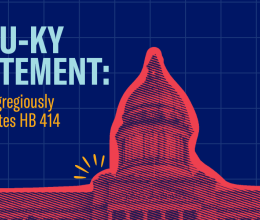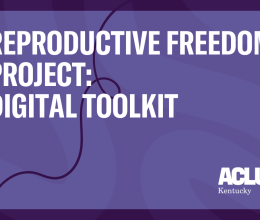
The American Civil Liberties Union asked the U.S. Supreme Court to overturn a decision by the Sixth Circuit Court of Appeals upholding Kentucky’s forced narrated ultrasound law against a First Amendment challenge. With the filing of today’s petition for a writ of certiorari, the case becomes the third challenge to an abortion restriction pending before the Supreme Court this term.
The law, also known as H.B. 2, requires doctors to force ultrasound images and a detailed description of those images on every patient prior to an abortion—even if the patient objects or is covering their eyes and blocking their ears. Prior to H.B. 2, providers in Kentucky always offered to display and discuss the ultrasound with their patients, but would never force that information on them against their will.
Major medical associations — including the American Medical Association, American College of Obstetricians and Gynecologists, and the American Public Health Association — oppose the law because it violates basic ethical and informed consent principles.
“This sort of extreme political interference in the doctor-patient relationship has no place in the exam room,” said Alexa Kolbi-Molinas, senior staff attorney with the ACLU Reproductive Freedom Project. “The sole purpose of this law is to shame and coerce someone who has decided to end their pregnancy. It’s time to stop criminalizing health care, interfering with personal decisions, and substituting political agendas for the expertise of health care professionals.”
When it was issued this past April, the ruling sparked an impassioned dissent from Sixth Circuit Judge Bernice Bouie Donald, who recognized that “H.B. 2 would require physicians to violate their professional and ethical obligations … [and] that H.B. 2’s one-size-fits-all approach would cause them to harm their patients.” As Judge Donald explained, the majority “decision opens the floodgates to states in this Circuit to manipulate doctor-patient discourse solely for ideological reasons.” She wrote, “The Commonwealth has co-opted physicians’ examining tables, their probing instruments, and their voices in order to espouse a political message, without regard to the health of the patient or the judgment of the physician.”
The ruling also conflicts with an earlier decision by the Fourth Circuit Court of Appeals, which struck down an identical North Carolina law because it violated the First Amendment. Unless the Supreme Court resolves this “circuit split,” a doctor’s basic First Amendment rights depend solely on the state in which they practice.
The plaintiffs in the case are represented by the ACLU, the ACLU of Kentucky, and the law firm of O’Melveny & Myers.
More about this case can be found here: https://www.aclu.org/cases/emw-womens-surgical-center-v-beshear



